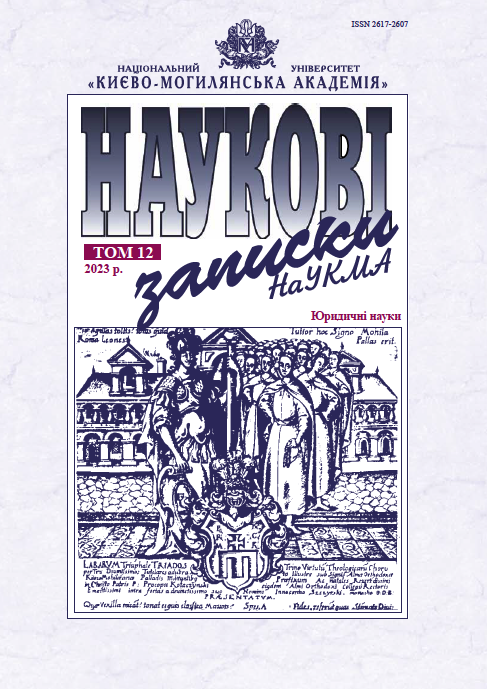Свобода релігії або переконань як правова цінність у сучасних дискурсах про права людини
DOI:
https://doi.org/10.18523/2617-2607.2023.12.4-12Ключові слова:
сталий розвиток, підхід спроможностей, фемінізм, деколонізаціяАнотація
У статті проаналізовано малодосліджені в українській науці виміри тлумачення прав людини, які відіграють ключову роль у сучасному формуванні мети та спрямованості наповнення права на свободу релігії або переконань. Розкрито основні положення щодо визначення й захисту релігійної свободи в кожному з сучасних підходів до інтерпретації прав людини: Цілі сталого розвитку, підхід спроможностей, деколоніальний та феміністичний підходи.
Поряд із класичною системою міжнародного права прав людини зазначені підходи розширюють призму поглядів у наповненні права на свободу релігії або переконань. Цілі сталого розвитку розглядають релігійну свободу в аспекті досягнення добробуту нинішніх і майбутніх поколінь та охоплення правовим захистом усіх, щоб не залишити нікого позаду («leave no one behind»). Підхід спроможностей доповнює формальне визначення права на релігійну свободу фактичною здатністю індивіда реалізувати це право. Деколоніальні та феміністичні студії містять ґрунтовну критику усталених понять права, деконструюючи й реконструюючи їх через аналіз прав і потреб жінок, корінних народів та інших маргіналізованих суспільством груп.
На підставі розгляду чотирьох підходів показано, як інтерпретації права на свободу релігії або переконань роблять її визначення більш чутливим та інклюзивним до особистісних, релігійних та культурних властивостей окремого індивіда.
Посилання
- Ackermann, Denise M. “Women, Religion and Culture: A Feminist Perspective on Freedom of Religion.” Missionalia: Southern African Journal of Mission Studies 22, no. 3 (1994): 212–26.
- Benn, Tansin, Symeon Dagkas, and Haifaa Jawad. “Embodied Faith: Islam, Religious Freedom and Educational Practices in Physical Education.” Sport, Education and Society 16, no. 1 (2011): 17–34. https://doi.org/10.1080/13573322.2011.531959.
- Bonvin, Jean-Michel. “Promoting capability for work: The role of local actors.” In Transforming unjust structures the capability approach, 121–42. Dordrecht: Springer Netherlands, 2006.
- Bouwman, Bastiaan. “From Religious Freedom to Social Justice: The Human Rights Engagement of the Ecumenical Movement from the 1940s to the 1970s.” Journal of Global History 13, no. 2 (2018): 252–73. https://doi.org/10.1017/S1740022818000074.
- Chan, Kathryn. “Religious Institutionalism: A Feminist Response.” University of Toronto Law Journal 71, no. 4 (2021): 443–79.
- Conill, Jesus. “The philosophical foundations of the capabilities approach.” In Handbook of the philosophical foundations of business ethics, edited by Christopher Luetege, 661–74. Springer, 2013.
- Cortina, Adela. “Capabilities, Human Rights and Business.” In Handbook of the philosophical foundations of business ethics. Springer, 2013. https://doi.org/10.1007/978-94-007-1494-6_19.
- Crabtree, Andrew, ed. Sustainability, Capabilities and Human Security. Palgrave Macmillan, 2020.
- Durham, Cole, Jr, and Elizabeth Clark. “The place of religious freedom in the structure of peacebuilding.” In The Oxford Handbook of Religion, conflict, and peacebuilding, edited by R. Scott Appleby, David Little, and Atalia Omer, 281–307. Oxford University Press, 2015.
- Durham, W. Cole. “The Significance of Freedom of Religion or Belief for Peace, Justice and Strong Institutions.” In Poverty and Prejudice, 235–40. Bristol University Press, 2023.
- Elkayam-Levy, Cochav. “Women’s Rights and Religion – The Missing Element in the Jurisprudence of the European Court of Human Rights.” University of Pennsylvania Journal of International Law 35 (2013): 1175. https://scholarship.law.upenn.edu/jil/vol35/iss4/11.
- Elson, Diane, Sakiko Fukuda-Parr, and Polly Vizard, eds. Human Rights and the Capabilities Approach: An Interdisciplinary Dialogue. Routledge, 2014.
- Enderle, Georges. “The capability approach as guidance for corporate ethics.” In Handbook of the philosophical foundations of business ethics, 675–91. Springer, 2013. https://doi.org/10.1007/978-94-007-1494-6_21.
- Fukuda-Parr, Sakiko, and Ismael Cid-Martinez. “Capability approach and human development.” In The Palgrave Handbook of Development Economics: Critical Reflections on Globalisation and Development, edited by Machiko Nissanke and José Antonio Ocampo, 441–68. 2019.
- Gibson-Graham, Julie-Kathryn. “Poststructural interventions.” In A companion to economic geography, edited by Eric Sheppard and Trevor J. Barnes, 95–110. Blackwell, 2017.
- Gopal, Priyamvada. “On Decolonisation and the University.” Textual Practice 35, no. 6 (2021): 873–99. https://doi.org/10.1080/0950236X.2021.1929561.
- Greenberg, Udi. “Catholics, Protestants, and the Violent Birth of European religious pluralism.” The American Historical Review 124, no. 2 (2019): 511–38.
- Haraway, Donna. “Situated Knowledges: The Science Question in Feminism and the Privilege of Partial Perspective.” In Space, Gender, Knowledge: Feminist Readings, 53–72. Routledge, 2016.
- Ivankiv, Iryna. “Right to Sustainable Development as One of the Rights of Humanity.” Studia Iuridica 82 (2020): 115–30.
- Jacobs, Leslie Gielow. “Adding Complexity to Confusion and Seeing the Light: Feminist Legal Insights and the Jurisprudence of the Religion Clauses.” Yale Journal of Law and Feminism 7, no. 1 (1995): 137–72.
- King, Richard. “Philosophy of Religion as Border Control: Globalization and the Decolonization of the “Love of Wisdom” (philosophia).” In Postcolonial Philosophy of Religion, 35–53. Springer, 2009.
- Mahadi, Alizan. “Adopting the Capabilities Approach in Developing a global Framework for measuring Sustainable Development.” Master’s Thesis, Uppsala University, 2012.
- Moi, Toril. What is a woman?: and other essays. Oxford University Press, 1999.
- Mushkat, Marion. “The Process of Decolonization International Legal Aspects.” University of Baltimore Law Review 2, no. 1 (1972): 16–34.
- Nussbaum, Martha C. Women and human development: The capabilities approach. Vol. 3. Cambridge University Press, 2000.
- Nussbaum, Martha C. “Capabilities as fundamental entitlements: Sen and social justice.” In Capabilities equality, 54–80. Routledge, 2007.
- Nussbaum, Martha C. Creating capabilities: The human development approach. Harvard University Press, 2011.
- Nyhagen, Line. “The Lived Religion Approach in the Sociology of Religion and its Implications for Secular Feminist Analyses of Religion.” Social Compass 64, no. 4 (2017): 495–511.
- O’Neill, Brenda, Elisabeth Gidengil, Catherine Côté, and Lisa Young. “Freedom of religion, women’s agency and banning the face veil: the role of feminist beliefs in shaping women’s opinion.” In Muslims, Migration and Citizenship, 49–64. Routledge, 2018.
- Ottuh, Peter O. O., Thomas Eneji Ogar, and Ibiang Obono Okoi. “Democracy and Western Imperialism: Towards Decolonizing Religionism in Nigeria.” Journal of Liberty and International Affairs 9, no. 2 (2023): 312–31. https://doi.org/10.47305/JLIA2392406o.
- Pereira, Gustavo. “Poverty as a lack of freedom: A short history of the capability approach.” In Handbook of the philosophical foundations of business ethics, 709–719. Springer, 2013.
- Radcliffe, Sarah A. “Decolonising Geographical Knowledges.” Transactions of the Institute of British Geographers 42, no. 3 (2017): 329–33.
- Robeyns, Ingrid. “The Capability Approach: A Theoretical Survey.” Journal of Human Development 6, no. 1 (2005): 93–117.
- Robeyns, Ingrid. Wellbeing, freedom and social justice: The capability approach re-examined. Open Book Publishers, 2017.
- Robinson, Fiona. The ethics of care: A feminist approach to human security. Temple University Press, 2011.
- Sano, Hans-Otto. “Development and Human Rights: The Necessary, but Partial Integration of Human Rights and Development.” Human Rights Quarterly 22, no. 3 (2000): 734–52. https://doi.org/10.1353/hrq.2000.0037.
- Scholz, Susanne, ed. The Oxford handbook of feminist approaches to the Hebrew Bible. Oxford University Press, 2020.
- Sen, Amartya. “The economics of happiness and capability.” In Capabilities and happiness, edited by Luigino Bruni, Flavio Comim, and Maurizio Pugno, 16–27. Oxford University Press, 2008.
- Sen, Amartya. Development as freedom. No. 1. Knopf, 2019.
- Thompson, Benjamin. “Determining Criteria to Evaluate Outcomes of Businesses’ Provision of Remedy: Applying a Human Rightsbased Approach.” Business and Human Rights Journal 2, no. 1 (2017): 55–85. https://doi.org/10.1017/bhj.2016.30.
- Watene, Krushil. “Nussbaum’s capability approach and future generations.” In The capability approach and sustainability, 20–38. Routledge, 2016.
- Wiredu, Kwasi. “Toward Decolonizing African Philosophy and Religion.” African Studies Quarterly 1, no. 4 (1998): 17–46.
##submission.downloads##
Опубліковано
Як цитувати
Номер
Розділ
Ліцензія
Авторське право (c) 2023 Tamara Horbachevska

Ця робота ліцензується відповідно до Creative Commons Attribution 4.0 International License.
Автори зберігають за собою авторські права на твір на умовах ліцензії Creative Commons Attribution 4.0 International License, котра дозволяє іншим особам вільно поширювати опублікований твір з обов’язковим посиланням на його авторів та його першу публікацію в цьому журналі.
Автори мають право укладати самостійні додаткові угоди щодо неексклюзивного поширення твору в тому вигляді, в якому його було опубліковано в журналі (наприклад, розміщувати роботу в електронному репозитарії установи або публікувати у складі монографії), за умови збереження посилання на його першу публікацію.
Політика журналу дозволяє розміщення авторами в мережі Інтернет (наприклад, у репозитаріях установ або на особистих веб-сайтах) рукопису роботи, як до подання його до редакції, так і під час його редакційного опрацювання, оскільки це сприяє виникненню продуктивної наукової дискусії та позитивно позначається на оперативності та динаміці цитування опублікованої роботи (див. The Effect of Open Access).




